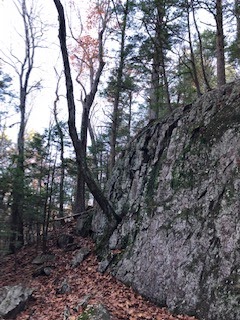Waking up to our patterns of thinking and behaving can be very, very painful.
I have some recent experience with this.
It wasn't that I learned something new about myself that I had never realized or considered before on a cognitive level, I had.
But I'm talking about the kind of waking up when you see your ineffective and unskillful patterns at both a cognitive level and an emotional level; when you embody the awakening.
The primary type of meditation that I practice is called Vipassana or "Insight" meditation.
An online article from Tricycle Magazine titled: "What Exactly is Vipassana Meditation" defines this type of meditation like this:
Vipassana can be translated as 'Insight,' a clear awareness of exactly what is happening as it happens.
I must say, due to recent events, I was briefly reconsidering if this is in fact the type of meditation that I would like to pursue. (That was a joke...but kinda not.)
Because "
clear awareness" during moments of sadness, grief, rage, loss, and disappointment can at times feel
excruciating.
Western Buddhist teacher and author Jack Kornfield wrote in his 2008 book The Wise Heart: A Guide to the Universal Teachings of Buddhist Psychology that:
Buddhists were actually the first cognitive-behavioral therapists.
As a trained Cognitive Behavioral therapist myself, I wholeheartedly agree with this statement.
Just consider the following statement from the 1st century BCE Buddhist text, The Dhammapada:
Speak and act from unwise thoughts, and sorrow will follow you as surely as the wheel follows the ox who draws the cart. Speak and act from wise thoughts and happiness will follow you as closely as your shadow, unshakable.
If this is true, and in my experience it is, then what if the "unwise thought" is more like a core belief like: I am unimportant. I am insignificant. I am unworthy. What would be the behaviors that follow?
This is how I understand and apply the Buddhist concept of
karma.
I know it can and does mean so much more, but what I have found most helpful (so far) is that
everything has a cause, and everything that has a cause, has an
effect.
Take for example, this idea I was introduced to about a year ago:
Hustling for worthiness.
This is a Brene Brown concept, and I have done this...A lot.
Of course most people have become familiar with
Brene Brown's social research on emotions like shame, vulnerability, courage, and belonging through her
Ted Talks and books, as have I, but I hadn't yet heard this specific turn of phrase.
It was the word "
hustling" that got me the most because it implies this rather inauthentic, game-like, wheeling-and-dealing effort to get a very basic human need--worthiness--met.
When I read it, I shamefully thought to myself, "
oh god, I do that all the time," and boy did I feel the pain of waking up in that moment.
In that moment I realized, "hustling for worthiness" was
my karma.
Or in other words, there were
causes--unmet needs--and this behavior was the
effect.
As I said before,
waking up can be painful.
Although, there are places and spaces for the
wayward pilgrim on the
path of spiritual awakening to
take refuge from this at times arduous journey.
Most recently I've been taking solace in another book by the 20th century Dutch theologian and professor
Henri Nouwen called
Spiritual Formation: Following the Movements of the Spirit.
I've resonated with a particular section called "
Am I a Rock or a Dancer" in the chapter called:
From Resentment to Gratitude.
In it he writes:
I once saw a stonecutter remove great pieces from a huge rock on which he was working. In my imagination I thought, 'That rock must be hurting terribly. Why does this man wound the rock so much?' But as I looked longer, I saw the figure of a graceful dancer emerge gradually from the stone.
Personally, I don't want to be a slab of cold, gray rock. No insight. No self-awareness. No awareness of other. No wisdom. No ability to recognize when I fall into my old habit of "hustling for worthiness."
I want to be the
dancer.
In fact, even I, who feels each piece of rock falling away that exposes a shoulder, a hand, a cheek most
painfully, can see that there is a
gift in there.
Not to mix metaphors, but the insight that can come from one of those moments of awakening can feel like the most glorious and unexpected football interception, late in the game, that even the player him or herself could not have anticipated.
In this way, waking up is most literally a
gamechanger.
So, I will continue to allow for the pain of waking up, but I will also look out for the gifts it may yield.
May it be so.






